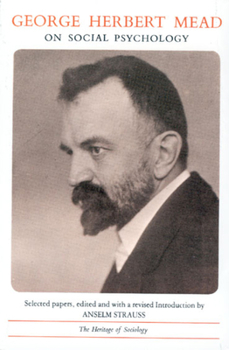George Herbert Mead on Social Psychology
Select Format
Select Condition 
Book Overview
One of the most brilliantly original of American pragmatists, George Herbert Mead published surprisingly few major papers and not a single book during his lifetime. Yet his influence on American sociology and social psychology since World War II has been exceedingly strong. This volume is a revised and enlarged edition of the book formerly published under the title The Social Psychology of George Herbert Mead. It contains selections from Mead's posthumous books: Mind, Self, and Society; Movements of Thought in the Nineteenth Century; The Philosophy of the Act; and The Philosophy of the Present, together with an incisive, newly revised, introductory essay by Anselm Strauss on the importance of Mead for contemporary social psychology. "Required reading for the social scientist."--Milton L. Barron, Nation
Format:Paperback
Language:English
ISBN:0226516652
ISBN13:9780226516653
Release Date:December 1964
Publisher:University of Chicago Press
Length:384 Pages
Weight:1.02 lbs.
Dimensions:0.8" x 5.3" x 8.1"
Customer Reviews
2 ratings
A Theoretical Maverick at his brooding best
Published by Thriftbooks.com User , 15 years ago
Although among theorists, George Herbert mead must be considered the "theorists' theorist," he nevertheless remains a towering enigma who marched through life to the cadence in his own head. A pragmatic philosopher by both training and intellectual predilection, and a life-long friend of John Dewey, Mead was also a brooding, pensive, tormented, uncertain craftsman, whose dabbling into Sociology turned out to be more important than the whole of his contributions to his chosen field, philosophy. He is known best for his ambiguity and for his paltry professional output owning in large part to an obsessive need to rewrite, rework, and massage his ideas until either there was nothing left of them, or they had either come full-circle and watered-down to the last precipitate. In the end, his endless massaging amounted to procrastination that left the task of pulling together his large fragments of theoretical papers, to his students and admiring colleagues. That said, Mead is important not because of these eccentricities, but because until the end of his life he was a deep structure systemic thinker unafraid to embrace "cutting-edge," and sometimes even tentative ideas -- especially those borrowed from the hard sciences which often served as the bedrock of his theoretical enterprises. He is known best for his large ideas, such as that science is the best instrument we have for intelligence control over our environment, for promoting the idea that even discrete interactions are affixed to the larger reality in a holistic way, for fully embracing and then evoking Darwin's Theory of evolution, and for his almost maverick interactionist posture that went against the grain of established structuralist theoreticians. He situated himself somewhere between the American pragmatist school and the European phenomenological school. Thus he was an intellectual Maverick without being intellectually promiscuous. He followed science more closely than he followed theoretical developments in either philosophy or sociology, or on either side of the Atlantic, and was quick to adopt the changing worldviews of the leading scientists, especially that of Darwin and the Quantum Physicists. Mead believed "intelligence" to be a verb and that "perception" by definition can never be passive: only active. To "perceive" is to be alive in the world and engaged with ones environment. According to Mead's theory, it is this "act" (of perception) and its emergent interactive and communicative properties that define social structure. Therefore interactions are not (as his critiques claim) structure-less: for process always precedes, is prior to, and is instrumental in defining form and shaping structure, Thus, following Berger and Luckmann's seminal "The Construction of Social Reality," fundamental to Mead's theoretical formulation, is the notion that social structure emerges from social process, i.e., from social interactions and communications. Thus as a result, the "social order"
Social Phychology & Sociology
Published by Thriftbooks.com User , 25 years ago
Mead, unhappy had never written a book, but this book is him ideas, and is the only phylosopher that makes a way between nature science and culture science. he makes the link between concrete & abstract





